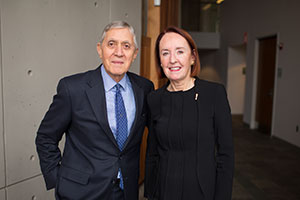

Discussing the Need for Advocacy
Changing Hearts and Minds for Science
On December 15, Mary Woolley, president and CEO of Research!America, spoke to a full LeFrak Auditorium to encourage students and research faculty to be educators and advocates for science. In her presentation, titled “Your Role in Changing Hearts and Minds for Science,” Ms. Woolley explained the prevailing views towards science and research among the general public and Congress, and suggested specific tactics that audience members could use to affect change. Research!America is the nation's largest not-for-profit public education and advocacy alliance working to make health research a higher national priority.

Dr. Allen Spiegel and Mary Woolley“As a messenger from Washington, I’m here to tell you that the news isn’t all bad,” said Ms. Woolley. She cited the March for Science (a second is planned for April), the success of advocacy groups like the March of Dimes, and a cadre of health activists who confront life-and-death challenges such as HIV/AIDS.
“But it is also a fact that our government appears to care more about defense than health,” she observed, noting that the White House has placed a bullseye on federal health and science agencies.
Though Einstein received a record-breaking $174 million in National Institutes of Health grants in 2017, future federal funding for medical schools is threatened. “This is compromising hopes and dreams of patients everywhere,” said Ms. Woolley.
Public Opinion and Science
A big part of the problem, she explained, is that science is still not on the radar of the American public. A Research!America poll found that though a majority of respondents agreed that scientists should shape policy about medical and health research, drug safety and efficacy, and air and water quality, 81 percent of respondents could not name a living scientist. And though a majority of respondents believed public policies should be based on science, 67 percent could not name a place where research is conducted. This reflects “an invisibility of research around the country,” she said.
View Ms. Woolley's presentation
Starting the Conversation
Ms. Woolley suggested ways to influence public policy—but the first step is knowing your audience. Administering what she calls the Starbucks Test, she asked, “Would you recognize your government representatives if you bumped into them at Starbucks? Would they recognize you? If not, find out what they look like and be ready with your pitch.”
She noted that elected officials actually want to meet their constituents and hear their views—which can affect budgets. “Start by thanking him or her for serving the public’s interest, then say that you also serve the public’s interest,” she said. “You’ve formed a relationship, which is essential for changing hearts and minds.”
Once the relationship is established, you’ve got an opening for inviting the official to visit your lab. She also encouraged scientists to “tweet directly to your representatives in Congress. Tell them it’s time to raise the caps”—the budget limits that hold down funding. “Failure to be an advocate can be hazardous to your career.”
A Formula for Communication
Ms. Woolley also discussed how non-scientists are understandably confused by the three steps forward/two steps back dynamic process of science. “They think it’s linear, more of an engineering kind of approach,” she said. To explain long-term progress, Ms. Woolley offered a model: “then-now-imagine.”
Example: Then, HIV/AIDS was a fatal disease that was spreading. Now, thanks to research, medications have changed HIV/AIDS from a death sentence to a manageable chronic disease. Imagine what it will be like someday when, thanks again to research, a vaccine for HIV/AIDS eradicates it.
“Hope is the most important message you can convey,” she told the packed auditorium. “And when you explain your work to friends, relatives and acquaintances, be sure to add ‘I work for you’—because you do.”
Ms. Woolley’s presentation was funded by the Kavli Foundation, a private organization dedicated to advancing science for the benefit of humanity, promoting public understanding of scientific research, and supporting scientists and their work.
Posted on: Friday, December 29, 2017

Tablet Blog